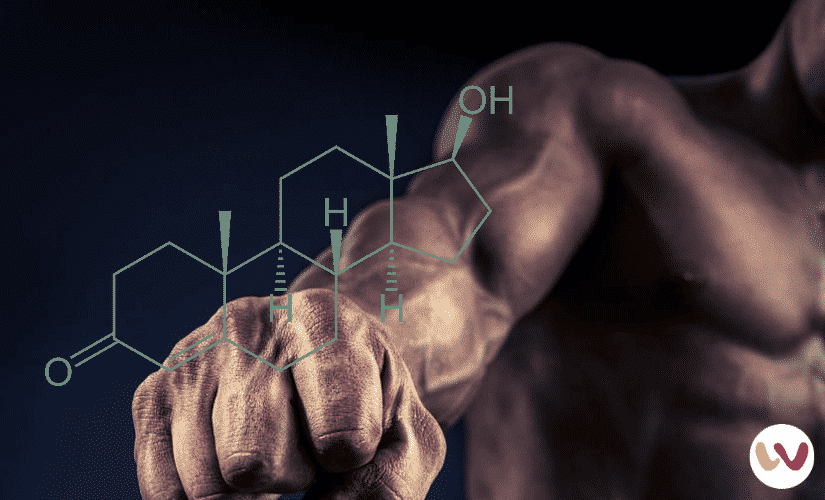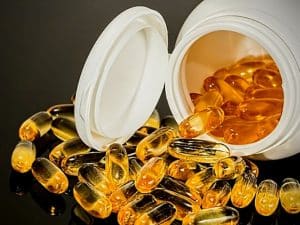Testosterone may seem like a commonly-known hormone, but this critical hormone has complexities that go beyond basic knowledge. A hormone this important should not be taken lightly.
Since this hormone affects both men and women, our definitive guide will map out everything you should know, may not know, and need to know about testosterone.
What is Testosterone?
Testosterone is a steroid hormone made by the adrenal cortex through Leydig cells.
While humans often think of testosterone as the “masculine” or “male” hormone, it is a hormone found in and produced by both men and women.
It is known to assist in the development of sex characteristics in men. It is also known to support ovarian function in women.
However, testosterone is principally a male hormone.
Testosterone is categorized as an Androgen. This term refers to any sex hormone that supports, reinforces, induces, or maintains the secondary sex characteristics in the human body.
The two primary Androgens in men are testosterone and another hormone referred to as androsterone.
In men, testosterone is found in and produced by the male testes and adrenal glands. The testosterone moves through the blood and can be passed through urine.
In the female body, the ovaries (also called gonads) produce testosterone. Aside from producing testosterone, the ovaries also respond to levels of testosterone in the body.
Understandably, unless there is some hormonal imbalance or disease present, women who are biologically female produce significantly less testosterone than men.
What is the Function of Testosterone?
The role of testosterone differs between men and women, especially since testosterone is a primary hormone for men.
Testosterone promotes secondary sex characteristics in men.
As well as that, testosterone also helps produce body hair, muscle growth, bone density, voice development (the dropping of the voice), development of the genitals, and thickness of facial hair.
Most of all, testosterone is also crucial for the development and maturation of sperm in men.
Testosterone is often linked to aggressive and competitive behavior. While studies have not related higher levels of testosterone to aggressive behavior, research in the Social Behaviour & Personality journal indicates that higher levels of testosterone are linked to lower levels of empathy.
It is easy to see that testosterone increases significantly during puberty, allowing for secondary sex characteristics to develop. However, testosterone is present even before puberty. Testosterone in men or boys can be traced back to the womb during the 8th or 9th week in a woman’s pregnancy.
Near the sixth or seventh week of pregnancy, a fetus begins to express its gender through its combination chromosomes. A fetus with an XY chromosome will start to produce testosterone around the ninth week of pregnancy to form a male reproductive tract.
The following offers a shortlist of functions of testosterone in the male body.
- Development and maturation of sperm
- Produce body hair
- Produce facial hair
- Increase muscle growth
- Control muscle mass
- Increase bone density
- Induce voice development (deeper voice)
- Controls the distribution of the body’s fat
- Controls sex drive
- Regulate pain tolerance/levels
- Regulates memory and learning
- Associated with spatial awareness
- Induces development of the male fetus during pregnancy
While women produce minimal amounts of testosterone, this hormone still plays a role in the female body.
In women, testosterone helps regulate the ovaries and maintain ovulation. It also improves muscle strength while keeping body fat.
The following is a shortlist of the functions of testosterone in the female body:
- Regulate menstruation and ovulation
- Increase muscle strength
- Maintain body fat
- Regulates memory and learning
- Associated with spatial awareness

What are the Types of Testosterone?
There are two primary forms of testosterone in the body:
- free testosterone (Free-T)
- bound testosterone.
The difference between the two is how they react to and interact with other chemicals present in the human body.
The bound testosterone more often binds to several different proteins. The proteins referred to as albumin and globulin are commonly tied to testosterone.
Free testosterone is not chemically bound to proteins, nor is it linked to any other substance in the body.
What are Testosterone Levels?
Doctors can run tests that measure the amount of testosterone levels in an individual. These tests usually include both types of testosterone (bound and free testosterone). Doctors can take these totals and decide if your levels or normal or abnormal.
Tests to gauge testosterone levels can be taken through urine, blood, saliva, or serum. More often than not, doctors or nurses will test your levels of testosterone during the morning.
This hormone naturally fluctuates during the day, but testosterone levels are highest during the morning.
For men, the average (normal) range is between 270 to 1070 ng/dL. The average male sits around 679 ng/dL. Testosterone levels generally decline after the age of 20.
For women, normal levels range from 8—60 ng/dL. Levels of testosterone significantly drop during and after menopause.
Please keep in mind that these ranges show the averages. Testosterone levels differ between individuals; the healthy level of testosterone for your body depends on your health, age, diet, weight, genetics, etc.
A woman may have higher levels of testosterone and hold this level as normal. On the other hand, one may have testosterone levels that are lower as an individual norm.
It is best to discuss your levels and your normal ranges with your doctor.
What Happens When Testosterone Levels are Low?
The results of lower testosterone levels differ depending on age and individual health.
Boys who have low levels of testosterone before puberty can experience several detrimental side effects, especially since testosterone is key to male development.
Boys with low testosterone may not develop the secondary male sexual characteristics listed above, like changes in voice or facial hair.
The bones of the boy may grow abnormally, making the boy tall, but a reduction of mass in bone and muscle will make the boy appear slenderer and more effeminate in stature and build.
Lower levels of testosterone in men can lower sexual drive, lose or redistribute fat in the body, and become infertile.
In some men, lower levels of testosterone can lead to significant mood swings.
For women, lower levels of testosterone rarely lead to any negative side-effects.
What If Your Testosterone is Too High?
For men, having exceptionally high levels of testosterone is not very common. However, studies have shown that men with higher levels of testosterone tend to exhibit increased levels of narcissism and abuse of power (Mead).
For men, higher levels of testosterone can physically improve blood pressure and weight maintenance.
For women, much higher levels of testosterone are severely detrimental to the body.
Higher levels of the hormone can lead to polycystic ovarian syndrome (PCOS). There can be irregularities in menstruation, and higher levels can lead to acne and facial hair.
Women with higher levels of testosterone are at risk of ovarian cancer.
What are the Benefits of Increasing Testosterone Levels?

Taking testosterone supplements can combat the negative side-effects of lowered testosterone levels.
These supplements can improve sexual drive, prevent muscle loss, prevent fat gain, maintain bone density, and enhance hair growth.
For women, testosterone supplements may be helpful during the treatment of some forms of breast cancer. However, these treatments are still not conclusive.
Are There Risks to Increasing Testosterone?
Like most supplements and hormone therapy, there are potential risks. The risks of hormonal supplements are increased with long-term usage.
Significantly, increasing levels of testosterone, primarily through supplements, can reduce the size and function of testicles.
When there is an excessive amount of testosterone in the body, the male body can convert this excess hormone into estrogen.
If the body converts excess testosterone into estrogen, the male may see fat moving towards the pectoral regions of the body.
It has been long believed that an increase in testosterone will lead to an increased risk of prostate cancer in men. Studies are inconclusive regarding this. Those who have developed prostate cancer sometime after hormone therapy are found to have less aggressive forms of prostate cancer.
In both men and women, increased levels of testosterone can increase insulin resistance, meaning it is easier to gain weight.
For women, increased testosterone can increase the risks of diabetes, some breast cancers, and heart problems.
Testosterone replacement therapy has specifically known side effects, including:
- Shrinking of testes
- Increase breast size
- Increased chance of heart attack
- Increased likelihood of stroke
- Increased chance of blood clots
- Low sperm count
- Infertility
- Acne
How Can I Increase Testosterone When it is Low?
There are several different methods to increase testosterone in both men and women.
The common ways to increase testosterone is through injections, tablets, creams, patches, and hormone therapies.
The safest (and most effective) way to improve your testosterone is to see a doctor.
Doctors can examine hormone levels and offer the best treatments to increase this hormone.
Some doctors may offer replacement therapy, which can include prescription medicine or patches.
There are several natural ways in which you can promote testosterone production in the body, such as losing weight, gaining lean muscle mass, and changing your diet.
Other Facts and Information about Testosterone
- Athletes tend to have higher levels of testosterone: this includes women.
- Men in a committed relationship show lower levels of testosterone, while women show increased levels in a committed relationship
- These levels return to normal within one to two years
- 2-4 million men in the United States have testosterone levels lower than normal
- Men are more likely to suffer from lower testosterone as they age
- Low levels of testosterone can lead to depression; on the other hand, depression can also lower testosterone levels.
- The FDA does not approve some testosterone supplements on the market, so research the supplement carefully before consuming it.
- Extra fat carried on the body can absorb testosterone from the bloodstream, reducing your testosterone levels.
- Excessive testosterone in the body can lead to infertility
- Biochemical treatments always aim to restore testosterone to normal levels, which results in the elimination of symptoms and the restoration of well-being
- Positive health choices correlate with higher testosterone levels over time, although they cannot wholly restore low levels of testosterone
- These choices include exercise, balanced diets, elimination of smoking, and the elimination of excessive drinking.
The Bottom Line
Testosterone is essential to regulating the body’s development and maintenance, especially in men. Lower levels of testosterone can significantly damage the body and quality of life.
While it is rare for complications from high levels of testosterone, men should always be aware of their bodies.
Signs of low testosterone should be taken seriously, and levels should be checked by the doctor.
More importantly, if you are considering taking supplements to increase testosterone, be aware of the available options and know how they affect the body.
It is crucial to understand where the supplement has come from and your intended usage.
Proper maintenance of testosterone levels may be a difficult and possibly lifelong task, but its results are worth the effort.
FAQs
Where is testosterone produced?
In men, testosterone is produced in both the testes and the adrenal glands.
In women, it is produced in the ovaries and adrenal glands.
What are the symptoms of low testosterone?
Symptoms of lower testosterone can include student growth, delayed puberty, reduced body hair, muscle loss, dry and wrinkled skin, increased body fat, decreased sexual drive, memory loss, and severe mood swings.
What does high testosterone mean in men?
High testosterone means that the combination of free and bound testosterone in your body is above the expected average for your body type.
Having too much testosterone is uncommon for men.
What is testosterone replacement therapy?
Testosterone replacement therapy (TRT) is a system that aims to normalize the levels of testosterone in the body to eliminate symptoms of low testosterone and promote health.
Testosterone replacement therapy can be implemented in several ways.
The hormones can be released through a patch that is worn on the skin. This patch is placed on the arm once a day, allowing the hormones to be absorbed.
The testosterone can be delivered through one of several gels. These are applied to the skin once a day and are absorbed through the pores. Some of these gels are utilized explicitly inside the nose.
Some patches can be applied to the gums of the mouth. These are stuck inside the mouth twice a day, allowing the hormones to be released into the tissues of the mouth. The hormones then may their way into the bloodstream.
Injections are a common form of TRT. These are directly injected into the muscles, boosting them with the hormone.
Small capsules, called pellets, can be placed inside tissues. These pellets slowly release testosterone into the bloodstream.
What is the Main Function of Testosterone?
Testosterone is the primary hormone that regulates sexual characteristics in men. It spikes during puberty, leading to the development of secondary sexual characteristics.
In women, testosterone helps regulate menstruation.
Do higher levels of testosterone increase fertility?
No. Taking supplements beyond necessity can lead to infertility.
Can you increase testosterone naturally?
Testosterone levels can be increased naturally to a certain extent.
If your hormone levels are significantly lowered, you will need chemical supplements to improve hormone levels. However, there are a few things you can do to help hormone levels.
Maintain your weight, exercise, eat healthily, and be sure to maintain a healthy sleep schedule. Sleep improves the body’s fundamental processes.
References:
Chen, W., Feng, H., LV, C., & Lu, J. “Relationships between empathy, gender, and testosterone levels in older adults.” Social Behaviour & Personality: an international journal, 46(11).
Mead, N., Baumeister, R., et al. “Power increases the socially toxic component of narcissism among individuals with high baseline testosterone.” Journal of Experimental Psychology, 147(4), 2018.









Add Comment